When Connection Starts to Fade
I was sitting at my favorite coffee shop last week, same worn-out leather chair, same oat milk latte. My best friend from college was across from me, laughing about some old inside joke. But something was… off. The words felt like they belonged to a different version of me. I smiled, nodded, sipped my coffee, but inside, I was screaming: I don’t fit here anymore 😔
It wasn’t anger. No big fight. Just this quiet, aching realization that the connection we’d built over years wasn’t vibing the same way.
I wasn’t mad at her. I still loved her. But I’d changed my values, my needs, the way I see the world. And she hadn’t. Not in a bad way, just… differently
This is what outgrowing feels like.

It’s not betrayal or rejection. It’s your soul whispering, “You’re evolving, and this dynamic doesn’t fit anymore.” It’s the quiet grief of losing something you still care about, without anyone doing anything wrong.
Why Outgrowing Happens (And Why It Hurts)
Outgrowing people isn’t about thinking you’re better than them. It’s about misalignment. You start healing old patterns maybe you’re setting boundaries, diving into therapy, or craving deeper conversations. Meanwhile, they’re still comfortable in the old dynamic, or maybe they’re just not ready to reflect the way you are. And that’s okay. People grow at different paces
Here’s why it happens:
- You’re healing, they’re not. You’re unlearning toxic patterns, like people-pleasing or suppressing emotions, while they normalize them.
- Your values shift. Maybe you’re prioritizing mindfulness or authenticity, and they’re still caught up in gossip or surface-level chatter.
- Nervous system craves resonance. Your body literally feels drained when you’re around people who don’t vibe with your current energy.
The hurt comes because this mismatch feels like loss. Your brain’s like, “But we’ve known them forever!” while your body’s screaming, “This feels heavy now.” It’s confusing. You love them, but you don’t feel seen anymore. That gap? It’s grief in disguise.
“Growth is not a rejection of others; it’s an embrace of your own evolution.” Dr. Nicole LePera
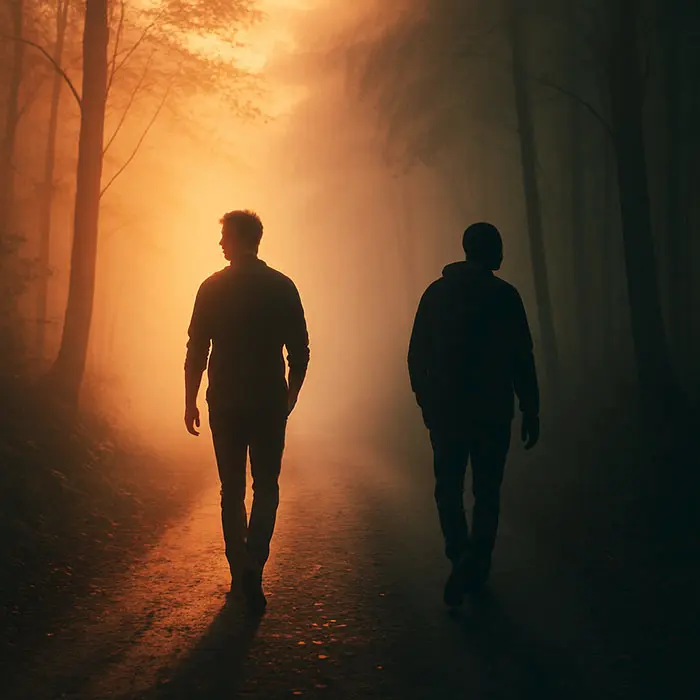
The Guilt That Sneaks In
Here’s the kicker: outgrowing someone comes with a side of guilt that hits like a freight train. You start questioning yourself:
- Am I abandoning them?
- Do I think I’m better than them?
- Who am I to change this dynamic?
I remember feeling this way with an old friend group. We’d been tight since high school, but after I started therapy, I couldn’t handle the constant venting sessions anymore. I wanted to talk about growth, dreams, or even just quiet moments. They wanted to rehash drama. I felt like a jerk for pulling back, like I was betraying our history. 😣
But here’s the truth: loyalty doesn’t mean staying stuck. You’re not abandoning anyone by honoring your growth. You’re just choosing authenticity over obligation. And that’s not selfish it’s survival.
For more on letting go of guilt, check out The Shame of Asking for Help it dives into why we feel bad for prioritizing ourselves.
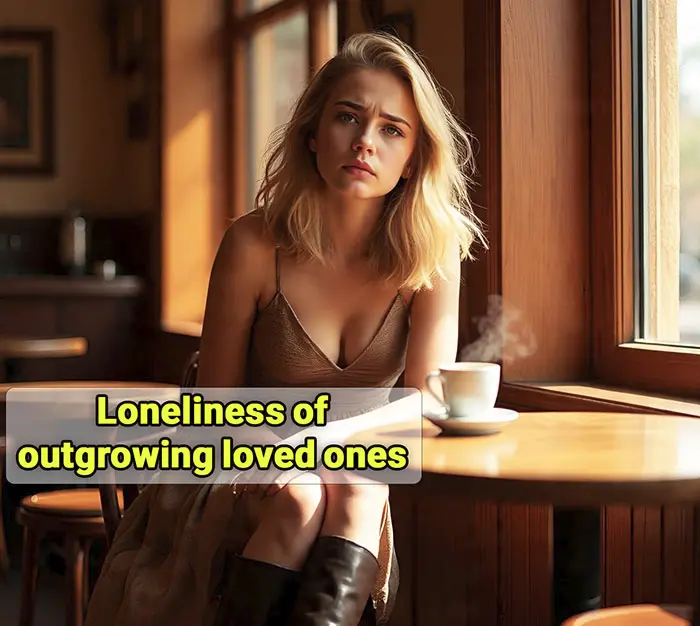
How Emotional Mismatch Drains You
Staying in relationships that don’t align with your current self can wreck your nervous system. Ever leave a hangout feeling exhausted for no reason? That’s your body signaling a mismatch. Here’s what happens:
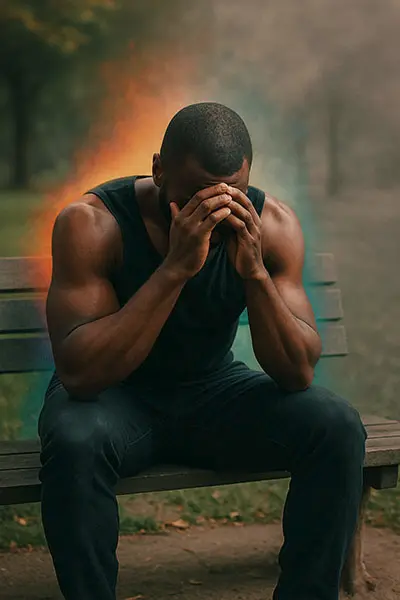
- Subtle anxiety. You’re hyper-aware of not being “too much” or saying something they won’t get.
- Emotional numbing. You shut down parts of yourself to avoid awkwardness, like censoring your new interests.
- Post-hangout burnout. You feel drained, not because of conflict, but because you were performing an old version of yourself.
This isn’t just emotional it’s physical. Your nervous system craves safety and resonance. When you’re constantly shrinking to fit old dynamics, it’s like running a marathon with no finish line. For more on this, see Emotional Exhaustion Isn’t Laziness.
Staying Too Long in Old Dynamics
Why do we stay in relationships that no longer fit? Because history feels sacred. I stayed in a friendship way too long because we’d been through everything together heartbreaks, graduations, late-night talks. Letting go felt like erasing all that. But here’s what I learned:
- History isn’t a contract. Just because you’ve known someone forever doesn’t mean you owe them your energy now.
- Fear of pain. You don’t want to hurt them (or yourself) by admitting things have changed.
- Hope they’ll catch up. You think, Maybe if I wait, they’ll grow too. Spoiler: you can’t force their timeline.
Staying small to preserve comfort dishonors your growth. It’s like wearing shoes you’ve outgrown they pinch, they hurt, and eventually, you can’t walk right. For tips on letting go, check out Why You Can’t Just “Let It Go”.
“You cannot be lonely if you like the person you’re alone with” – Wayne Dyer
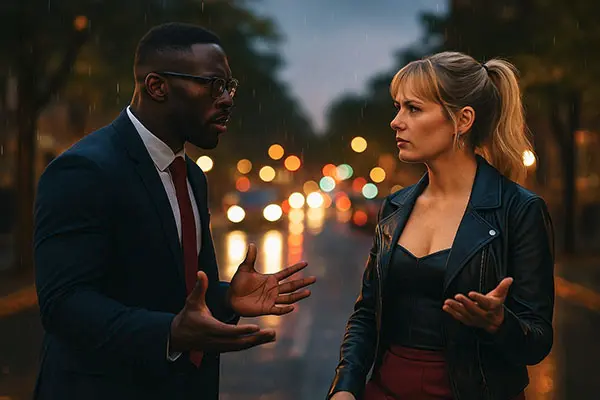
Outgrowing Family: A Special Kind of Grief
Outgrowing family hits different. There’s this extra layer of obligation because, well, they’re family. I remember a holiday dinner where I tried talking about my therapy breakthroughs, and my uncle laughed it off, saying, “You’re overthinking life.” Ouch. 😬
Family outgrowing can look like:
- Parents who dismiss your boundaries as “disrespectful.”
- Siblings who mock your self-care as “selfish.”
- Relatives who don’t get why you’re “different now.”
You love them, but their resistance to your growth feels like rejection. It’s okay to create emotional distance without cutting ties “Emotional Growth”. Sometimes, love means nodding politely at family gatherings while protecting your peace. For more on this, see The Quiet Grief of Setting Boundaries With Family.
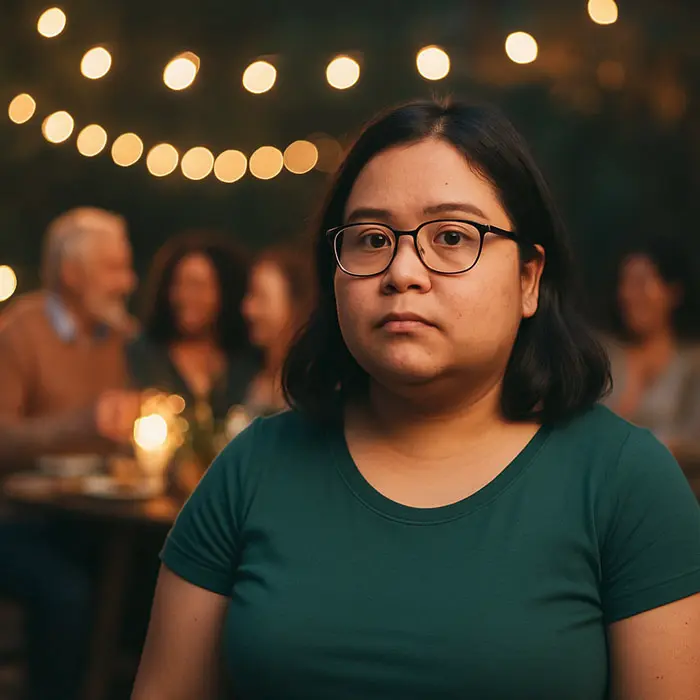
Outgrowing in the LGBTQ+ Community
For folks in the LGBTQ+ community, outgrowing relationships can carry unique weight. Coming out or embracing your identity often sparks a shift in how you connect with others. Maybe you’re seeking queer-affirming spaces, but old friends or family don’t understand your journey.
I’ve seen friends in the community drift from childhood buddies who don’t get pronouns or dismiss their identity as a “phase.” That disconnection stings, especially when you’re already navigating a world that can feel isolating. Creating space for your authentic self might mean finding chosen family who celebrate your growth, not question it. For more on building emotional safety, check out The Fear of Being Misunderstood.
Compassionate Ways to Move Forward
Letting go doesn’t mean slamming doors. It’s about creating space for your growth while honoring what was. Here’s how to do it gently:
- Honor the past. Acknowledge the love and memories without forcing them to define your present. “Those were beautiful chapters, but I’m writing a new one now.”
- Soften the distance. You don’t need a big breakup speech. Try fewer meetups, shorter calls, or lighter convos.
- Release loyalty guilt. Time served doesn’t mean forever owed. You’re allowed to prioritize your peace.
- Grieve without shame. It’s okay to cry over a friendship fading. Grief means it mattered, not that you’re wrong.
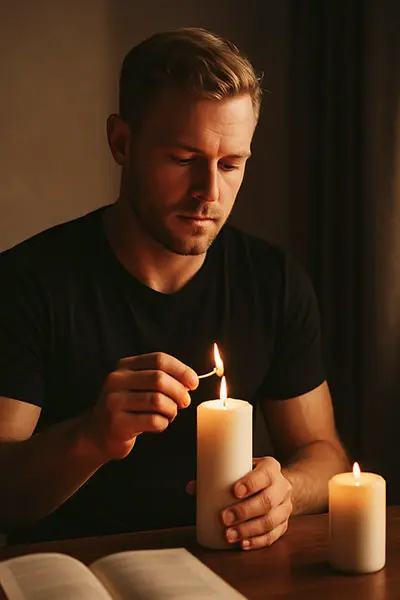
For more on boundaries, check out The Fear of Setting Boundaries.
The Loneliness of Becoming Your True Self
Here’s the part no one warns you about: growth can be lonely. When you outgrow people, you might feel like you’re standing in this weird in-between space not quite connected to your old life, not yet settled in your new one. It’s like moving to a new city where you don’t know the streets yet.
You might:
- Crave deeper convos no one’s ready for.
- Feel unseen even when you’re right there.
- Censor yourself to avoid awkwardness.
That loneliness isn’t a sign you’re doing it wrong. It’s proof you’re doing it right. You’re shedding old skins to make room for your true self. And yeah, it’s scary, but it’s also sacred. For more on this, see The Loneliness of Growing Without Your Old Identity.
Rebuilding Resonance After Loss
The beautiful thing about outgrowing? It clears space for aligned connections. As you lean into your growth, you’ll naturally attract people who:
- Meet you where you’re at.
- Nourish instead of drain.
- Celebrate your authenticity, not judge it.
I remember joining a book club after distancing from old friends. At first, I was nervous, but these strangers got me in ways my old crew didn’t. We talked about feelings, dreams, the messy stuff and it felt like home. Trust that the right people will find you when you show up as your real self.
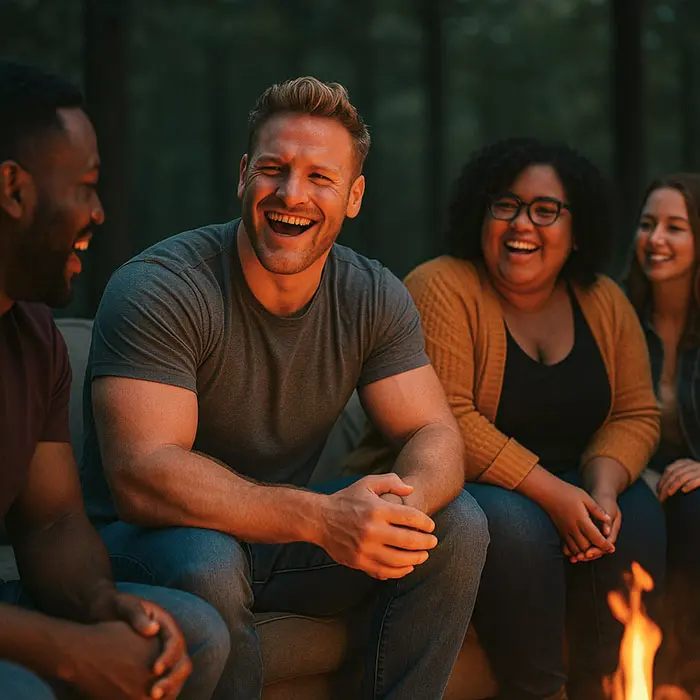
Practical Tools to Ease the Transition
Here are some real, doable ways to navigate the grief and loneliness of outgrowing:
- Journal the feelings. Write a letter to the person you’re drifting from (don’t send it). Thank them for what was, and name what’s changing.
- Practice grounding. When loneliness hits, try the 3-3-3 rule: name 3 things you see, hear, and feel. It calms your nervous system.
- Breathe through guilt. Try box breathing: inhale 4 seconds, hold 4, exhale 4, hold 4. It helps you process without spiraling.
- Seek small connections. Join a class, group, or online community that aligns with your new interests. Even one convo can spark hope.
For more grounding techniques, check out The Quiet Panic: When Anxiety Feels Like You’re Not Even Here.
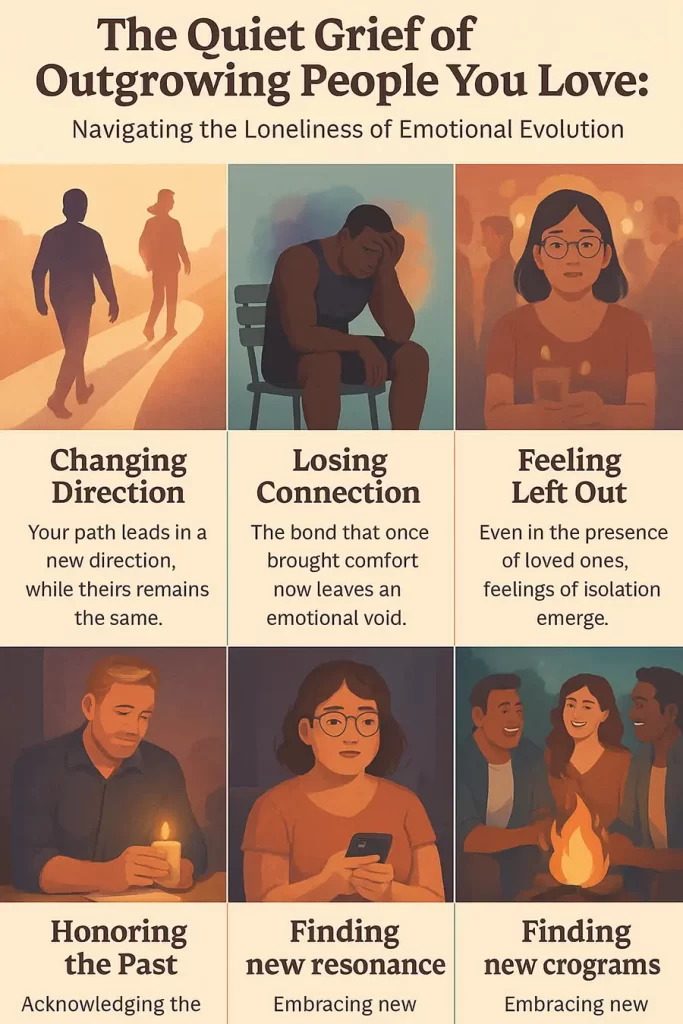
How to Honor Your Growth Without Shame
You don’t have to shrink to keep connections alive. Here’s how to move forward:
Time needed: 8 minutes
How to Honor Your Growth Without Shame
- Celebrate what was
Write down 3 things you loved about the relationship. It helps you honor the past without clinging.
- Set soft boundaries
You don’t need to ghost. Try, “I’m focusing on some personal growth right now, so I might be less available.”
- Trust the process
Loneliness is temporary. Your growth is opening doors to people who’ll get you on a deeper level.
For external resources, check out Dr. Gabor Maté’s work on attachment and authenticity or The Holistic Psychologist’s guide to nervous system healing. Both offer deep insights into why we cling to old connections and how to let go with love.

Conclusion: Growth Is Both Grief and Gift
Outgrowing people you love is one of the messiest, most human parts of growth. It’s not about cutting people off or thinking you’re “above” them. It’s about listening to your soul when it says, “This doesn’t fit anymore.” You’re allowed to grieve what’s fading, miss what was, and still step into who you’re becoming.
So light a candle for the old connections. Cry if you need to. Then trust that your growth is making space for something new relationships that see you, nourish you, and vibe with the real you. You’re not abandoning anyone. You’re just choosing yourself. And that’s the bravest thing you can do. 🌟
Ready to embrace your growth without guilt? Start by exploring Self-Care for Highly Sensitive People for tools to protect your energy while evolving.
FAQs About Outgrowing Loved Ones
Nope. You’re honoring your growth. Staying small to keep things comfy isn’t loyalty it’s self-betrayal.
Your nervous system feels unsafe losing familiar bonds. It’s grief, not failure. Give it time and seek aligned connections.
otally. Sometimes space lets both of you evolve, and you might vibe again on new terms. But don’t force it.
Their feelings are valid, but your growth isn’t harm. You’re allowed to evolve, even if it’s uncomfortable for them.
100%. Missing them means they mattered. Grieve the shift, but don’t let it pull you back into old patterns.
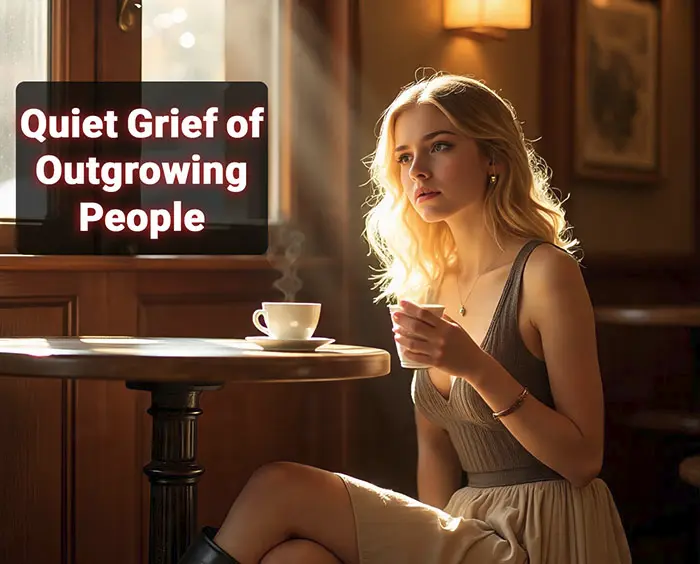
some parts resources for this article:
- Medium: A reflective essay on embracing growth and letting go of those who choose stagnation.
- Medium: Explores how stagnant individuals can drain your emotional energy, and why distancing may be necessary.
- Tiny Buddha: Offers six compassionate strategies to stay connected while outgrowing family dynamics.
Related articles I recommend you don’t miss
✨ Last updated on 11.08.2025
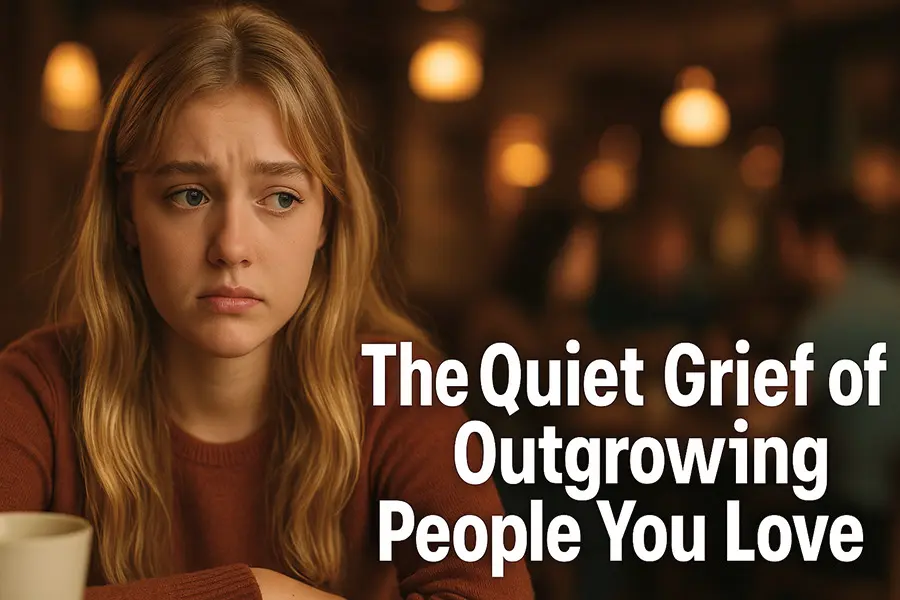




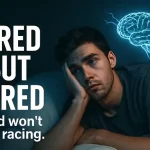





Leave a Reply